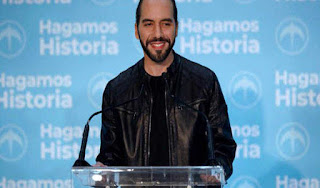Nayib Bukele has won the presidential elections held last Sunday in El Salvador. Bukele is the first outsider who does not belong to either of the established ARENA (right wing) or FMLN ( left wing) parties which dominated the politics of the country in the last two decades. He got around 54% of the votes which was more than the combined total percentage of the votes obtained by the candidates of the two main parties. The ARENA candidate got 32% while the ruling party FMLN’s got only 14%. With his impressive victory of getting more than fifty percent of votes, Bukele has avoided a second round of elections. He was the candidate of an alliance of smaller parties called as GANA.
The young ( 37 years old) Bukele has earned his reputation as an able and visionary administrator as the mayor of the capital city San Salvador from 2015 to 2018. He is a social media star who used tools such as Twitter and Facebook effectively reaching out to millions of voters directly. He announced his candidature and manifesto through Facebook Live. This had appealed to the young generation disillusioned with the traditional parties. Supremely confident of the social media strength, he refused to participate in the traditional debate with the other presidential candidates. Nor did he hold any press conferences.
Bukele has kept away from the ideological polarisation of the country and promises to govern pragmatically. The voters liked his quote, “I don’t talk about left or right anymore, this is outdated in the modern era.” Although his alliance includes right wing elements, he had started off his political career as member of the left wing FMLN party, which expelled him when he questioned the party’s leadership. Bukele is of Palestine origin.
El Salvador, the smallest country (in area) in Central America with 6.5 million people, has huge problems. The main issue is the ongoing gang violence and crime. The country has become notorious with one of the highest murder rates in the world. Mara Salvatrucha, popularly known as MS-13 and the Barrio 18 (18thstreet gang) are the two dominant gangs which hold the country to ransom with killings, crimes and drug trafficking. The rivalry between these two became so violent at one stage in 2012, the government intervened and brokered a ceasefire between MS 13 and the Barrio 18. In order to bring the two sides to the negotiating table, the government relaxed conditions in the prisons in which the members of the two gangs were held. Following this peace deal, the murder rate had dropped immediately. But this truce broke down in 2014 and crime has gone up again.
The origin of these two gangs is Los Angeles. During the civil war in Central America in the eighties, several hundred thousands had fled to US to escape the violence. The US had destabilised El Salvador, Guatemala and Honduras during the cold war and Contra War and had subverted democracy by supporting right wing military dictatorship. The Americans had armed and trained right wing militias which killed thousands of people including the famous Archbishop Romero in 1980.
The Salvadoreans are again fleeing to escape the violence of the gang wars. This is the reason for the caravans trying to enter US for seeking asylum.
The second major problem of El Salvador is the rampant corruption. Some of the previous presidents of the country have been accused and convicted of massive corruption. Bukele’s campaign slogan was,“There’s enough money when no one steals.” He has promised to establish an international anti-corruption agency, as it was done in Guatemala.
Of course, the most fundamental problem is poverty. The country needs poverty alleviation and job creation programmes.
India’s exports to El Salvador were 70 million dollars in 2017-18. There is scope to increase the exports to 200 million if Indian companies explore the opportunities seriously. El Salvador has established an embassy in New Delhi and is seeking Indian investment and development assistance.


